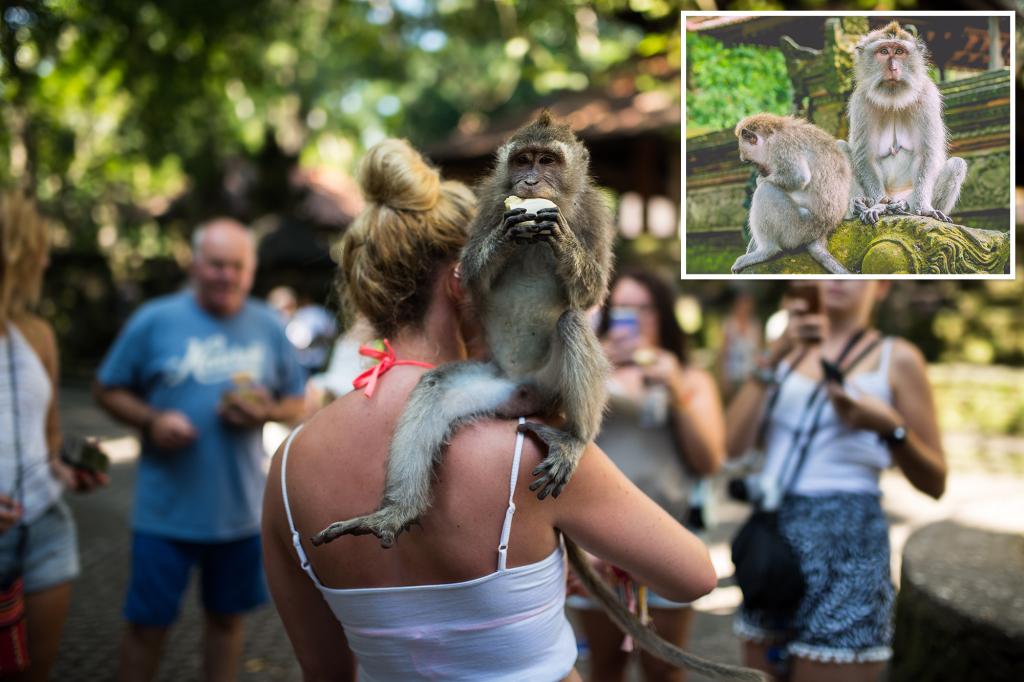A Holiday Turned Nightmare: Sydney Family’s Bali Monkey Encounter and the Costly Aftermath
What began as a heartwarming Father’s Day surprise quickly descended into a traumatic ordeal for Flavia McDonald and her family. Seeking to escape Sydney’s persistent rain, Flavia, her husband, and their 12-year-old daughter Lorena planned a spontaneous getaway to sunny Bali. “My daughter had the idea of finding some sun after so much rain in Sydney as a surprise for her dad for Father’s Day,” Flavia explained. Though she had previously visited Bali multiple times, she had hesitated about bringing children due to concerns about “Bali belly.” However, their daughter’s thoughtful Father’s Day gift idea won out, and the family departed Sydney on September 5th with visions of poolside relaxation and memorable experiences. “We thought it would be a memorable week… being by the pool in sunny Bali would be remarkable,” Flavia recalled, unaware of how differently “memorable” their trip would become.
Unfortunately, the weather didn’t cooperate with their plans, greeting them with overcast skies and heavy rain instead of the sunshine they’d hoped for. Determined to make the most of their vacation despite the unfavorable conditions, the family decided to venture from their hotel in Seminyak to Ubud, where the forecast promised less rain. They specifically planned to visit the famous monkey sanctuary, anticipating a fun, different experience that would take just a couple of hours before returning to their hotel. “Ubud would be something different… something fun,” Flavia said of their decision. They arrived at the sanctuary on Wednesday morning to find it exceptionally crowded, likely due to other tourists also seeking shelter from the forecasted afternoon storms. Despite having visited before, Flavia was surprised by the overwhelming number of visitors. The family carefully followed all safety guidelines provided upon entry—keeping bags closed and removing items like sunglasses and hats that might attract the monkeys’ attention.
After wandering through the sanctuary for about 40 minutes, the family paused at an amphitheater area where many visitors were seated. Flavia’s husband and daughter joined others on the benches, observing monkeys at a distance. What happened next occurred with startling speed—within minutes, a monkey jumped onto her husband’s shoulders, then quickly transferred to Lorena. “She was paralyzed [in fear],” Flavia recounted. Remembering the warnings against sudden movements, the family remained still as the curious monkey began pulling at Lorena’s clothing and searching her pockets. As Flavia carefully approached to shoo the animal away, the monkey suddenly bit her daughter’s neck. “Within five seconds, it just bit her on the neck,” Flavia explained. “I was petrified but wanted to keep calm so she wouldn’t panic… and make things worse.” Shockingly, despite the crowded area where the incident occurred, no sanctuary staff were present to supervise or assist during the frightening encounter.
Initially, Lorena didn’t feel pain from the bite due to shock, but Flavia quickly noticed blood where the monkey’s teeth had pierced her daughter’s skin. “I looked down at her neck, and I just said ‘oh my god,'” she recalled. “She thought it was a scratch… but then we saw the bite mark with blood.” The family immediately sought help at the sanctuary’s first aid station, where staff downplayed their concerns, claiming the “monkeys were very clean” and dismissing the risk of rabies. Rather than directing them to proper medical care, staff simply washed the wound with soap and water, insisting that would be sufficient treatment. “They kept saying we don’t need to worry,” Flavia said, growing increasingly anxious as her own research contradicted this casual approach. “She was bleeding… and I was just thinking, this is not enough. I was exploding inside. All my research was saying this was very dangerous and that she needs to go to a clinic with the rabies vaccine.”
Taking matters into her own hands, Flavia located the nearest clinic with rabies vaccines, understanding that quick action was crucial, especially with a bite to the upper body. By the time they arrived at the medical facility, Lorena had fallen into a state of deep shock. Then came another shock—the medical bill of 69 million Indonesian Rupiah (approximately USD $4,165.69). Despite having travel insurance, the emergency situation required immediate payment, forcing the family to use their personal funds to cover the expensive treatment. The rabies prevention protocol was excruciating for young Lorena. “One of the injections actually had to go in the area of the bite, so my daughter… who is 12… I have never seen her scream like the way she did in that hospital,” Flavia shared. The treatment involved multiple injections—two directly into the bite area, plus others in her arm and leg. Additionally, Lorena was prescribed medication to prevent herpes B virus infection, requiring her to take six tablets daily for two weeks.
This harrowing experience highlights a growing concern for tourists visiting Bali. Earlier in the year, Australian travelers had been warned about increasing rabies infections on the island, with “red zones” identified in popular tourist areas including South Kuta, Nusa-Dua, and Changgu. Smart Traveller has emphasized that rabies is present throughout Indonesia and is 100% fatal if not properly treated, urging travelers to get vaccinated before visiting. The disease can be transmitted by various mammals, though dogs, cats, and monkeys are the primary vectors. For Flavia and her family, what should have been a joyful escape from Sydney’s rainy weather instead became a traumatic and costly ordeal. “If I had read anything like this, anything similar, I would’ve had a different approach to going to the park,” Flavia reflected, now determined to raise awareness among other travelers planning Bali visits. “I would’ve been a little more aware that something like this can actually happen. It ruined the trip for us.” Her story serves as a sobering reminder that even carefully planned vacations can take unexpected turns, and thorough research about potential health risks at popular tourist destinations is essential preparation for international travel.













